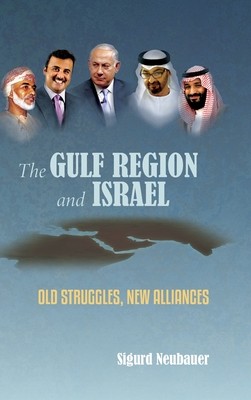
- We will send in 10–14 business days.
- Author: Sigurd Neubauer
- Publisher: Kodesh Press L.L.C.
- Year: 2020
- Pages: 368
- ISBN-10: 1947857401
- ISBN-13: 9781947857407
- Format: 15.2 x 22.9 x 2.4 cm, kieti viršeliai
- Language: English
- SAVE -10% with code: EXTRA
Reviews
Description
From the outset of his presidency, Donald Trump sought to narrow differences between Israel and the six monarchies of the Gulf Cooperation Council (GCC)-Bahrain, Kuwait, Oman, Qatar, Saudi Arabia and the United Arab Emirates (UAE)-as part of his strategy to isolate Iran.
With that objective in mind, Trump's first visit abroad as president was to Riyadh in May 2017-where he addressed the U.S.-Arab-Islamic Summit-immediately followed by a visit to Israel.
The President's message was clear: Saudi Arabia and Israel would serve as co-pillars of the U.S. security architecture for the broader Middle East. Under that vision, Egypt, Jordan and the six Gulf monarchies-together with Israel-would isolate Iran diplomatically. The second plank of this strategy was anchored in the so-called "Maximum Pressure" campaign, which sought for all practical purposes to expedite the collapse of Iran's economy as part of an effort to strengthen Washington's standing vis-Ã -vis Tehran. The third plank focused on solving the Israel-Palestinian conflict. These dynamics, the Trump-administration reasoned, would help set the stage for the renegotiation of the Iran agreement, formally known as the Joint Comprehensive Plan of Action.
Trump's vision, however, faced immediate resistance-not from Iran or its regional proxies, but rather from some of Washington's very own Gulf partners when they imposed a blockade on Qatar only weeks after his Riyadh address. While the crisis between Saudi Arabia, UAE, Bahrain and Egypt over Qatar was initially understood in Washington as an inter-Arab dispute, Sigurd Neubauer examines the overlooked and widely misunderstood Israeli and Omani roles in this feud.
EXTRA 10 % discount with code: EXTRA
The promotion ends in 21d.17:35:02
The discount code is valid when purchasing from 10 €. Discounts do not stack.
- Author: Sigurd Neubauer
- Publisher: Kodesh Press L.L.C.
- Year: 2020
- Pages: 368
- ISBN-10: 1947857401
- ISBN-13: 9781947857407
- Format: 15.2 x 22.9 x 2.4 cm, kieti viršeliai
- Language: English English
From the outset of his presidency, Donald Trump sought to narrow differences between Israel and the six monarchies of the Gulf Cooperation Council (GCC)-Bahrain, Kuwait, Oman, Qatar, Saudi Arabia and the United Arab Emirates (UAE)-as part of his strategy to isolate Iran.
With that objective in mind, Trump's first visit abroad as president was to Riyadh in May 2017-where he addressed the U.S.-Arab-Islamic Summit-immediately followed by a visit to Israel.
The President's message was clear: Saudi Arabia and Israel would serve as co-pillars of the U.S. security architecture for the broader Middle East. Under that vision, Egypt, Jordan and the six Gulf monarchies-together with Israel-would isolate Iran diplomatically. The second plank of this strategy was anchored in the so-called "Maximum Pressure" campaign, which sought for all practical purposes to expedite the collapse of Iran's economy as part of an effort to strengthen Washington's standing vis-Ã -vis Tehran. The third plank focused on solving the Israel-Palestinian conflict. These dynamics, the Trump-administration reasoned, would help set the stage for the renegotiation of the Iran agreement, formally known as the Joint Comprehensive Plan of Action.
Trump's vision, however, faced immediate resistance-not from Iran or its regional proxies, but rather from some of Washington's very own Gulf partners when they imposed a blockade on Qatar only weeks after his Riyadh address. While the crisis between Saudi Arabia, UAE, Bahrain and Egypt over Qatar was initially understood in Washington as an inter-Arab dispute, Sigurd Neubauer examines the overlooked and widely misunderstood Israeli and Omani roles in this feud.


Reviews